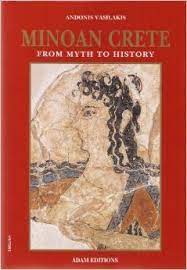Minoan Crete: From myth to history
Minoan Crete: From myth to history by Andonis Vasilakis, 1999, is the book I chose for the 2023 NONFICTION READER CHALLENGE in the category History.
I
didn’t know much about the Minoans, but after visiting Crete in 2022 I was
impressed by the archaeological remains and the beautiful landscape and became
curious about the people who had lived there in prehistory. I am also intrigued
by the idea of Minoan Crete as the “first civilization.”
The
book is divided into seven sections detailing: information about the land and
people; Minoan mythology; and five historical periods, in chronological order,
ranging from the Stone Age to the Third Palace Period (1450-1350 BC).
Although
there is information about the archaeology of Crete, this is not an academic
book on archaeology; there are assumptions without support. For example,
“Figurines probably had a religious function and the smallest ones were used as
amulets.” There is no further explanation of why Vasilakis ‘knows’ this or
where he got this information from. There is a bibliography, and a glossary, at
the end of the book, but no footnotes relating the books listed to the
information in the book. However, for a reader who is interested in history and
in the historical basis of myths, this is a satisfying read.
In
terms of historical description, Vasilakis is extremely thorough. In each
section (in chronological order), he includes the history, art and technology
(including, for example, architecture, tombs, pottery, figurines, etc.),
economy, society and beliefs.
The
section, “Minoan Crete in Ancient Mythology” is extremely interesting since
Vasilakis includes a long list of the myths and the characters and writes as if
they were really historical.
The
book includes many photographs (perhaps hundreds; I didn’t count) of both
landscapes and of ancient objects and is printed on glossy paper, so the colors
are glorious. It is the kind of book that can be read cover to cover as a
novel, or can be read in different sections according to the reader’s interest.


Comments
Post a Comment